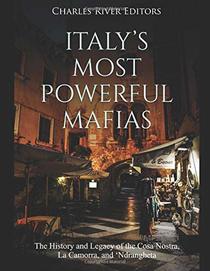What an eye-opening book; I had no idea there was more than one type of 'mafia' in Italy. They seem to have evolved in different areas. Reading other books, I've noticed that many Italians look down upon Sicilians (both historically and today). This book takes the time to explain where this prejudice comes from and what it has spawned. The mafia code requires its members to be subtle, submissive and especially violent.
The Cosa Nostra (our thing), started with the Sicilian fruit growers -- of all things. As the country of Italy unified, they looked down on the Sicilians, just wanting the island for 2 things: tax income and mandatory military service.
The Camorra of Naples seems to be the most violent group; they were generally illiterate. They tended to have short lifespans because of their violence. Amazingly, this group emerged from the weak prison system where the inmates literally ran the prisons. When they got out of jail, they were already organized.
The 'Ndrangheta' emerged in Reggio Calabria, where the population had little faith in the governing authorities. This organization is based on ties of kinship, and each family unit is part of a larger clan. This is the only mafia that is centralized; no matter how far out in the world they work, they report back to Italy. They started when Calabrian criminals emerged from prison, they formed a loose confederation until an economic crisis came to the country and they were able to take advantage of it.
It is surprising to hear that Benito Mussolini waged war on organized crime. He did it to get support in Sicily, where organized crime was rampant. Mussolini's work drove the mafia underground until after his death. When the Allies landed in Sicily, they purged the fascists, which also happened to help the mafia gain back power.
After reading this book, I have no more questions about why so many Italians emigrated from Italy in the late 19th century and early 20th century. Their lives were (and are) very difficult. 4.5 stars
The Cosa Nostra (our thing), started with the Sicilian fruit growers -- of all things. As the country of Italy unified, they looked down on the Sicilians, just wanting the island for 2 things: tax income and mandatory military service.
The Camorra of Naples seems to be the most violent group; they were generally illiterate. They tended to have short lifespans because of their violence. Amazingly, this group emerged from the weak prison system where the inmates literally ran the prisons. When they got out of jail, they were already organized.
The 'Ndrangheta' emerged in Reggio Calabria, where the population had little faith in the governing authorities. This organization is based on ties of kinship, and each family unit is part of a larger clan. This is the only mafia that is centralized; no matter how far out in the world they work, they report back to Italy. They started when Calabrian criminals emerged from prison, they formed a loose confederation until an economic crisis came to the country and they were able to take advantage of it.
It is surprising to hear that Benito Mussolini waged war on organized crime. He did it to get support in Sicily, where organized crime was rampant. Mussolini's work drove the mafia underground until after his death. When the Allies landed in Sicily, they purged the fascists, which also happened to help the mafia gain back power.
After reading this book, I have no more questions about why so many Italians emigrated from Italy in the late 19th century and early 20th century. Their lives were (and are) very difficult. 4.5 stars




